
The Ministry of Finance proposes to impose special consumption tax on sugary drinks - Photo: THANH HIEP
Accordingly, the Ministry of Finance proposed to impose a special consumption tax of 10% on soft drinks according to Vietnamese standards with a sugar content of over 5g/100ml (soft drinks) because of concerns that sugary drinks will cause weight gain, obesity, and contribute to increasing the risk of diabetes for users.
Businesses complain of difficulties
With the above proposal, a series of bottled soft drinks on the market such as Coca-Cola, Pepsi, zero-degree green tea, herbal tea, bottled oolong tea... containing sugar will be subject to special consumption tax in the near future.
However, some experts and National Assembly deputies expressed concern that the proposal to impose special consumption tax on sugary bottled soft drinks would not achieve the policy goal of changing consumer behavior, and on the contrary, could cause difficulties for beverage production businesses.
Mr. Nguyen Van Viet, Chairman of the Vietnam Beer, Alcohol and Beverage Association (VBA), said that in recent years, beverage businesses have faced many difficulties due to epidemics and conflicts around the world .
Many businesses are facing difficulties when the supply chain is blocked, raw material prices increase by 30-40%, and they have to cut labor. To support beverage businesses to maintain production, Mr. Viet recommends that management agencies carefully consider not to add sugary soft drinks to the list of subjects subject to special consumption tax in the near future.
According to National Assembly delegate Pham Van Hoa (Dong Thap province), amending the Law on Special Consumption Tax is necessary, but proposals to increase taxes and expand taxable subjects, such as sugary soft drinks, must be carefully considered.
In particular, in the context that Vietnam is having to deal with reciprocal taxes from the US and the Government is determined to achieve an 8% growth target this year, Mr. Hoa said that it is necessary to comprehensively evaluate the tax imposition. International experience also shows that imposing taxes on sugary soft drinks is ineffective in preventing and reducing overweight and obesity and does not ensure fairness.
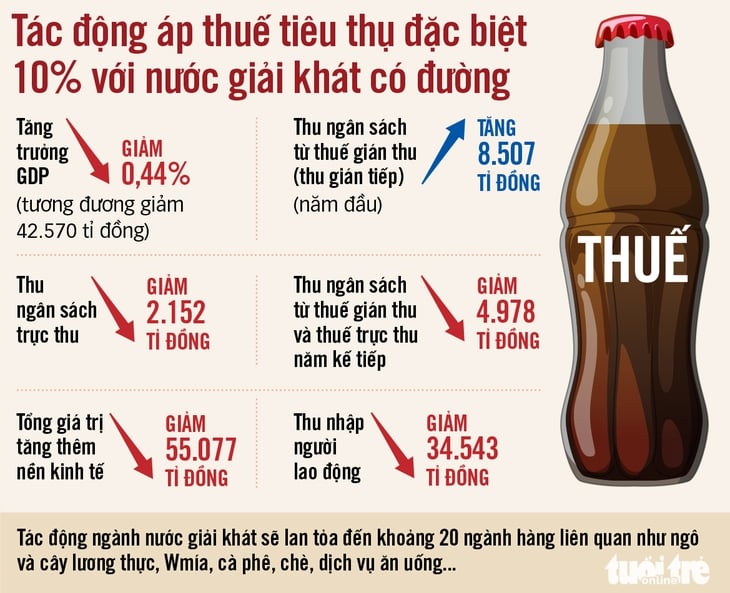
Source: Institute for Policy and Strategy Studies - Graphics: TAN DAT
Calculate carefully before imposing taxes
Many experts also believe that soft drinks are not the main and only cause of weight gain and obesity; if taxes and prices for bottled soft drinks containing sugar are increased, 49% of consumers will switch to street drinks containing sugar, which do not ensure food hygiene and safety.
National Assembly Representative Ta Van Ha noted that when imposing a tax on sugary soft drinks, careful research is needed to avoid affecting children's rights. On the one hand, we need to protect children's rights to access products containing sugar, but on the other hand, we also need to pay attention to the increasing rate of overweight and obesity in children.
The problem is that we need to find out the cause because many health and nutrition experts share that overweight and obesity have many causes. If sugar is the cause, then tax sugar or tax all sugar-containing products instead of just soft drinks to ensure fairness.
Mr. Ha supports finding a harmonious and fair solution, when to impose taxes, and what is the appropriate tax rate. There needs to be a fair and impartial view when building special consumption tax. It needs to be placed in a synthesis of many goals, including the growth target in the current period.
Similarly, Dr. Vo Tri Thanh, Director of the Institute for Brand and Competitiveness Strategy, also affirmed that the proposal to increase special consumption tax and expand the tax base will cause many difficulties for the beverage industry. This is the period when we need to accelerate growth, and imposing taxes can have the opposite effect.
Commenting on the proposal to increase special consumption tax on sugary soft drinks, the representative of Amcham Vietnam also raised the issue that Vietnam is negotiating with the US to reduce tariffs, so the proposal to increase special consumption tax needs to be considered because it could lose the meaning of tariff reduction.
Sharing the same opinion, Dr. Can Van Luc, Chief Economist of BIDV, also noted that taxable items such as sugary soft drinks need to clarify the scientific basis, practice, international experience and specific characteristics of Vietnam. Imposing special consumption tax on sugary soft drinks at this time will negatively impact businesses in the industry and other businesses in the supply chain.
Furthermore, the Government and ministries are currently making efforts to come up with solutions to stimulate domestic consumption through support solutions such as reducing value-added tax until the end of 2026, while reducing and extending some taxes and fees. The proposal to increase special consumption tax on soft drinks at this time, according to some experts, is not convincing and will affect domestic consumption stimulation.
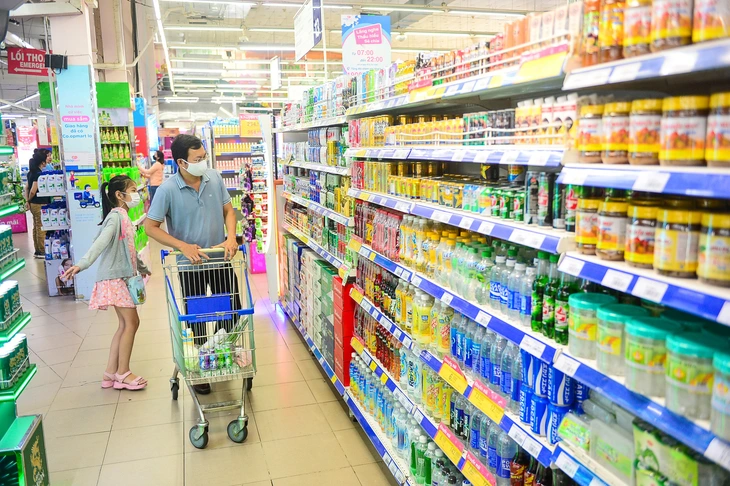
Experts and National Assembly deputies are concerned that the proposal to impose special consumption tax could cause difficulties for beverage manufacturing businesses - Photo: Q.DINH
* Dr. Nguyen Minh Thao (Institute for Policy and Strategy Studies - Central Policy and Strategy Committee):
Does excise tax reduce sugary beverage consumption?
In my opinion, the explanation of the draft Law on Special Consumption Tax (amended) has not clearly stated whether the imposition of a 10% special consumption tax on sugary soft drinks ensures fairness or whether the consumption of sugary soft drinks will be reduced. The drafting agency has also not clearly stated the impact of imposing a tax on sugary soft drinks. All arguments of the drafting agency refer to the recommendations of the World Health Organization on the risk of overweight and obesity when consuming sugary soft drinks. However, the drafting agency has not clearly stated what percentage of children are overweight and obese due to the consumption of sugary soft drinks.
In principle, when there is no comprehensive impact assessment, it is not advisable to propose imposing taxes. If there is clear evidence, propose taxes at appropriate levels, ensuring business production activities and effectively regulating consumer behavior. Given the current difficult business context, the proposed tax period should be from 2028 to support businesses in maintaining production and business activities.
There are many types of soft drinks that contain sugar, but the argument of the drafting agency is not convincing enough to impose a tax according to Vietnamese standards. There are many other sugary soft drink products on the market that do not meet Vietnamese standards but contain a lot of sugar. Therefore, imposing a tax is likely to create unfairness, causing certain consequences for the production chain of beverage enterprises.
Especially in the context of businesses being affected by current trade tariffs, careful consideration is needed when issuing legal documents that have a major impact on businesses.
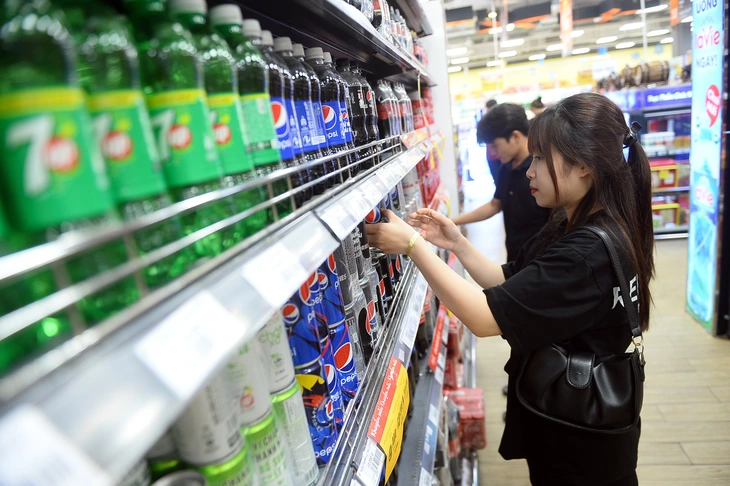
People buy soft drinks at a supermarket in Ho Chi Minh City - Photo: QUANG DINH
* Mr. Nguyen Van Viet (Chairman of Vietnam Beer, Alcohol and Beverage Association):
Should care about business health
Every year, the beverage industry, including soft drink enterprises, contributes over 60,000 billion VND in taxes, equivalent to about 3% of total budget revenue and creates millions of jobs. Therefore, it is necessary to pay attention to the health of enterprises, nurture revenue sources and domestic consumption demand. When enterprises weaken, employment decreases, labor income is affected, purchasing power declines, and economic recovery slows down.
* Mr. Nguyen Duy Hung (Chairman of the Corporate Relations and Legal Committee, Tan Hiep Phat Group):
Overall efficiency should be taken into account.
Businesses in the beverage industry agree with the policy of protecting consumer health, limiting non-communicable diseases, and reducing weight gain and obesity. However, tax policies need to take into account overall effects.
The main goal of the policy is to reduce weight gain and obesity, but it has not been determined that sugary soft drinks are the main, primary, and sole cause. Sugar is one of the causes of weight gain and obesity, and sugary soft drinks contain a small amount of sugar. There are no data or conclusions on the relationship between people with weight gain and obesity and the use of sugary soft drinks. Therefore, if a policy of imposing special consumption tax on sugary soft drinks is issued, it will lead to price increases, disrupt consumer behavior, and affect the entire chain of related benefits such as tea farmers, logistics, construction, etc.
* Mr. Bui Khanh Nguyen (Deputy General Director of External Communications & Sustainable Development, Coca-Cola Vietnam Beverage Company Limited):
Tax policy should be fair
The special consumption tax policy on sugary soft drinks needs to be based on fairness according to two criteria. First, the tax policy must be based on science, and attention should be paid to research on the causal relationship. The user group and the control group need to have larger-scale, more reliable research. Second, if tax is imposed, it needs to be applied comprehensively, not just targeting one product while ignoring other sugary products.
* Ms. Nguyen Minh Tam (Director of External Affairs, Government Relations, Suntory Pepsico Vietnam Company):
Will affect many related industries
The imposition of special consumption tax will not only affect the beverage industry but also related industries such as retail, packaging, sugar cane, transportation, and tourism. The sudden tax increase will reduce consumer purchasing power, disrupt business operations, and affect investment activities of enterprises in many industries. This will aggravate the disadvantages and challenges for the business community, especially when the US has just imposed reciprocal taxes.
Proposal to extend tax schedule on soft drinks to 2027
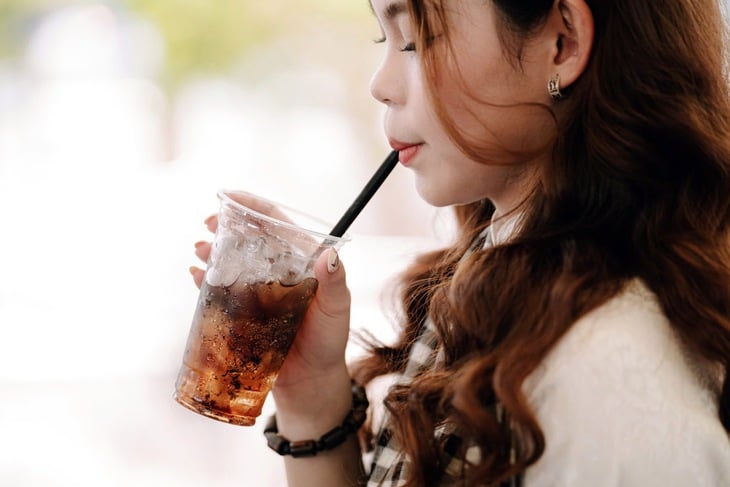
The Ministry of Finance proposes to impose special consumption tax on soft drinks according to Vietnamese standards - Photo: THANH HIEP
Speaking to Tuoi Tre on the afternoon of April 24, a representative of the Ministry of Finance said that there was a proposal to postpone the deadline for applying special consumption tax on beverage products including sugary soft drinks, wine, beer... as previously recommended.
The basis for this proposal, according to the Ministry of Finance, is that the US announcement of reciprocal tax will have a strong impact on production and business activities as well as business psychology. Therefore, the Government has directed the Ministry of Finance to study and report to the Government for consideration of a number of issues regarding the draft revised Law on Special Consumption Tax.
"After reporting and receiving approval from the Government, the Ministry of Finance sent a document to the National Assembly's Economic and Financial Committee proposing to extend the implementation roadmap for applying the Law on Special Consumption Tax on alcohol, beer, sugary soft drinks... to 2027 instead of 2026 as previously planned.
At the same time, the tax rate for this group of goods is also lighter than the draft proposal submitted to the National Assembly at the October 2024 session. Accordingly, for sugary soft drinks, the Ministry of Finance proposed a tax rate of 8% applied from 2027 and increased to 10% from 2028. As for alcohol and beer, the application period is also from 2027 with the tax rate increasing by 5% each year," a representative of the Ministry of Finance informed.
The Ministry of Finance also said that according to the Law on Promulgation of Legal Documents, at the National Assembly session taking place next May, the National Assembly Standing Committee will receive explanations and revise this bill to submit to the National Assembly for approval.
Thailand imposes tax to reduce sugar in drinks
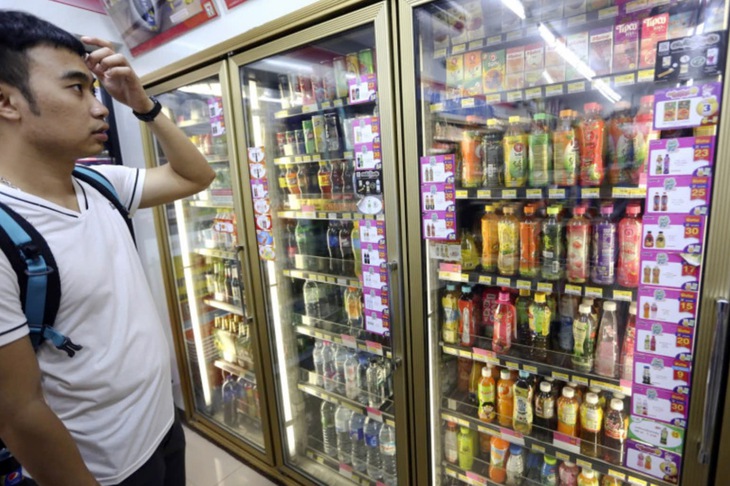
Various drinks at a convenience store in Bangkok, Thailand - Photo: Patipat Janthong
On April 1, the new tax based on the sugar content in sugary products and beverages in Thailand officially took effect. The Thai Ministry of Finance emphasized that if beverage and sugary product manufacturers do not improve their formulas to reduce sugar content, they will be subject to a higher excise tax than in the previous period.
Since 2017, Thailand has imposed an excise tax on sugar content in products, in addition to the previous tax on beverages, in an effort to reduce sugary drink consumption. The new tax on April 1 is the fourth increase in this tax, which has been increased every two years since 2017.
The purpose of this tax is to encourage manufacturers to reduce the sugar content in their products, thereby improving public health by reducing the risk of obesity, diabetes, high blood pressure and many other diseases. In the fourth increase, drinks with a sugar content of 10 - 14g/l will be subject to an excise tax increase from 3 baht to 5 baht (about 3,800 VND). Beverages with a sugar content of less than 6g/l will be exempt from tax.
Drinks with sugar content of 6-8g/l will be taxed at 1 baht (about 778.48 VND). For drinks with sugar content of 8-10g/l, the tax will be 3 baht (more than 2,330 VND). Drinks with sugar content of 14-18g/l, as well as drinks with sugar content of 18g/l or more, will still be taxed at the same rate of 5 baht.
The Thai Excise Department believes that this latest tax hike will not significantly increase the price of beverages, nor will it place an undue burden on consumers. The department said that manufacturers have responded well to the taxes by reducing sugar content, switching to artificial sweeteners, or other sugar substitutes mixed with natural sugar, which are considered less harmful to consumers' health.
According to statistics from 2018 - 2023, many sugary beverage manufacturers in Thailand have adjusted their formulas to enjoy low tax rates. This is reflected in the number of drinks containing 6g/l of sugar or less (tax-free level) increasing from 90 products in 2018 to 4,736 products in 2023. The number of products with sugar content within the low tax rate also increased during this period. Meanwhile, the number of products with high sugar content and subject to high tax rates decreased. For example, the number of drinks with sugar content exceeding 14g/l decreased from 819 products to no products on the Thai market today.
Source: https://tuoitre.vn/can-nhac-thoi-diem-ap-thue-tieu-thu-dac-biet-nuoc-ngot-20250425093520422.htm



![[Photo] President Luong Cuong presents the 40-year Party membership badge to Chief of the Office of the President Le Khanh Hai](https://vphoto.vietnam.vn/thumb/1200x675/vietnam/resource/IMAGE/2025/5/19/a22bc55dd7bf4a2ab7e3958d32282c15)
![[Photo] Panorama of the Opening Ceremony of the 43rd Nhan Dan Newspaper National Table Tennis Championship](https://vphoto.vietnam.vn/thumb/1200x675/vietnam/resource/IMAGE/2025/5/19/5e22950340b941309280448198bcf1d9)


![[Photo] Close-up of Tang Long Bridge, Thu Duc City after repairing rutting](https://vphoto.vietnam.vn/thumb/1200x675/vietnam/resource/IMAGE/2025/5/19/086736d9d11f43198f5bd8d78df9bd41)



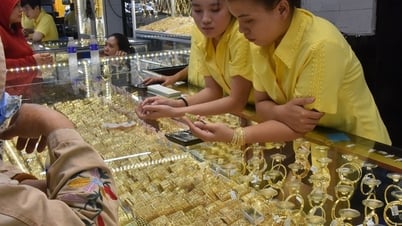

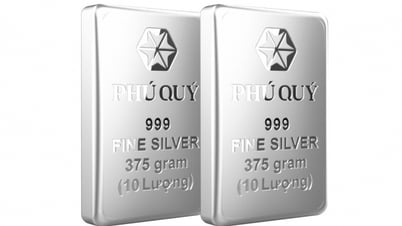

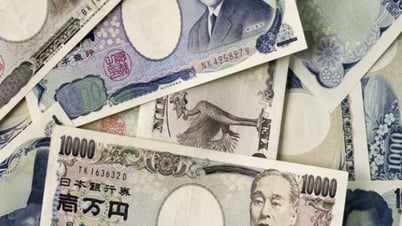






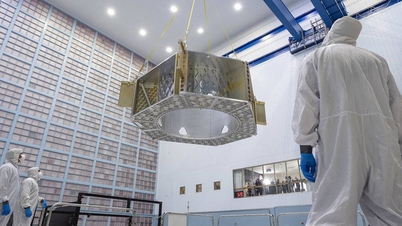



![[Photo] General Secretary To Lam attends the conference to review 10 years of implementing Directive No. 05 of the Politburo and evaluate the results of implementing Regulation No. 09 of the Central Public Security Party Committee.](https://vphoto.vietnam.vn/thumb/1200x675/vietnam/resource/IMAGE/2025/5/19/2f44458c655a4403acd7929dbbfa5039)











































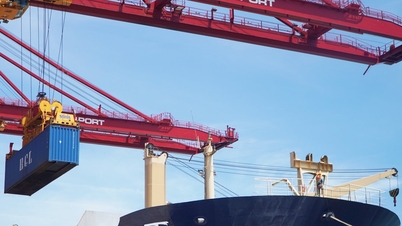







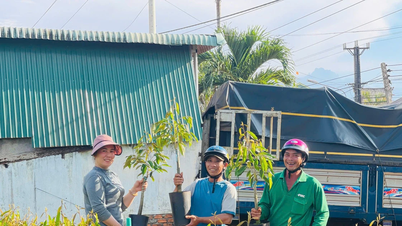
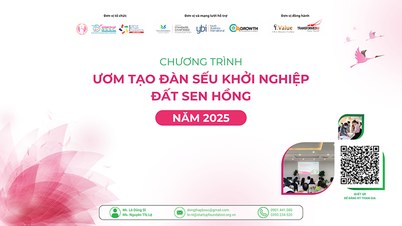





![[VIDEO] - Enhancing the value of Quang Nam OCOP products through trade connections](https://vphoto.vietnam.vn/thumb/402x226/vietnam/resource/IMAGE/2025/5/17/5be5b5fff1f14914986fad159097a677)



Comment (0)